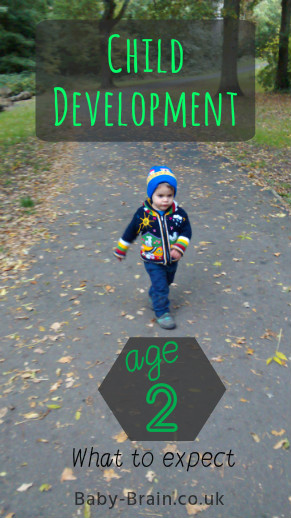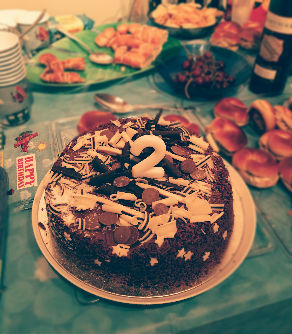…
So it happened again – the toddler had another birthday – two already; unbelievable.
Where has the time gone? Time flies? Blink and you’ll miss it. They grow up so fast – plus all those other cliché phrases I never paid much attention to but now seem so relevant. I’m sure it wasn’t that long I ago I posted about his first birthday,
 So what can I expect developmentally at age 2?
So what can I expect developmentally at age 2?
♦ Children show awareness of the difference between thoughts in the mind and things in the world.
In pretend play (e.g., pretending a block is a car), toddlers show that they can distinguish between an object – the block – and thoughts about the object – the block as a car.
♦ Emotions and others: 2 year olds understand that people will feel sad if they do not get what they want, and happy if they do.
♦ A two year old may see that there might be a difference between what they want and what another person wants, and this can be seen in what they say:
2-year-olds talk about what they and others want and like and feel; when they are 3, they also talk about what people think and know.
(all points above and quotes from Astington & Edward, 2010)
Language development
Talking point outlines typical development between 2 and 3 years old including a progress checker questionnaire. By age 3 children will usually:
- Understand longer instructions, such as ‘make teddy jump’ or ‘where’s mummy’s coat?’
- Understand simple ‘who’, ‘what’ and ‘where’ questions.
- Put 4 or 5 words together to make short sentences, such as ‘want more juice’ or ‘he took my ball’.
- Start to use simple plurals by adding ‘s’, for example ‘shoes’ or ‘cars’.
We also had a telephone call this week to arrange the toddler’s two year health and developmental review with the health visitor
Cognitive Development
From Piaget’s stages, we are now moving from the Sensorimotor Stage (0-2 years old) to the Preoperational Stage (2-7 years old).
-
The Sensorimotor Stage involves the development of motor activities such as holding, shaking an item and generally experimenting through trial and error (e.g. if I shake this rattle I learn that it makes a noise; I put this in my mouth and see what it tastes like). Early language develops in this stage and also object permanence – learning that something exists even if you cannot see it.
-
In the Preoperational Stage the child begins to use language and develop in areas of memory and imagination – hence increased pretend play (from Wood, Smith & Grossniklaus, 2001; read more here)
And what did we get up to?
We had a little party for the toddler (Little Lovely) with some friends and family, toys and cake. He got some great presents including a train set that he hasn’t stopped playing with and scoffed a giant piece of chocolate cake. Unlike last year he could actually make a good attempt at blowing the candle out!
References:

